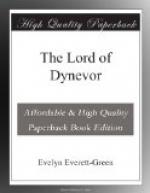These were the best terms the unhappy Raoul could obtain for himself, and he was forced to abide by them. The fathers of the abbey were honest and trustworthy, and carried his letters to the king as soon as they had penned them for him. Raoul was clever in diplomatic matters, and was so anxious for his own safety that he took good care not to drop a hint as to the evil conduct of the people of Iscennen, which might draw upon them the royal wrath and upon him instant death. He simply represented that he was weary of his charge of this barren estate, that he preferred life in England and at the court, and found the revenues very barren and unprofitable. As the former owners had redeemed their character by quiet conduct during the past year and a half, his gracious Majesty, he hinted, might be willing to gratify them and their people by reinstating them.
And when Edward read this report, and heard the opinion of the father who had brought it — a wily and a patriotic Welshman, who knew how to plead his cause well — he made no trouble about restoring to Llewelyn and Howel their lands, only desiring that Wendot should renew his pledge for their loyalty and good conduct, and still hold himself responsible for his brothers to the king.
And so Llewelyn and Howel went back to Carregcennen, and Wendot and Griffeth remained at Dynevor, hoping with a fond hope that this act of clemency and justice on the part of Edward would overcome in the mind of the twins the deeply-seated hatred they had cherished so long.
CHAPTER IX. THE RED FLAME OF WAR.
“Wendot, Wendot, it is our country’s call! Thou canst not hang back. United we stand; divided we fall. Will the Prince of Dynevor be the man to bring ruin upon a noble cause, by banding with the alien oppressor against his own brethren? I will not believe it of thee. Wendot, speak — say that thou wilt go with us!”
Wendot was standing in his own hall at Dynevor. In the background was a crowd of retainers and soldiers, so eagerly discussing some matter of vital interest that the brothers stepped outside upon the battlemented terrace to be out of hearing of the noise of their eager voices.
There was a deep gravity on Wendot’s face, which was no longer the face of a boy, but of a youth of two-and-twenty summers, and one upon whom the cares and responsibilities of life had sat somewhat heavily. The tall, well-knit frame had taken upon it the stature and developed grace of manhood; the sun-browned face was lined with traces of thought and care, though the blue eyes sparkled with their old bright and ready smile, and the stern lines of the lips were shaded and hidden by the drooping moustache of golden brown. There were majesty, power, and intellect stamped upon the face of the young Lord of Dynevor, and it was very plain to all who observed his relations with those about him that he was master of his own possession, and that though he was greatly beloved by all who came in contact with him, he was respected and obeyed, and in some things feared.




